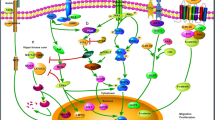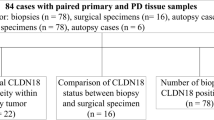Abstract
Background and Aim
Our purpose is to study the clinical significance of Fas/FasL expression in colon cancer and liver metastases (LM).
Material and Methods
The expression of Fas/FasL in 68 patients with colon cancer was examined immunohistochemically and correlated to the clinicopathological features of the tumors.
Results
High expression of FasL, was observed in stage D and in LM (p=0.024). Fas expression was reduced in stage D tumors and in LM, when compared to earlier stages of disease (p=0.024). LM had also shown a decreased expression of Fas (p=0.016). Tumors with low FasL expression upregulate more often their Fas expression (p = 0.028). No correlation could be established regarding the patients survival.
Conclusions
Low expression of Fas and high expression of FasL are more often in colon tumor stage D and in liver metastasis; these imply tumor aggression, resistance against apoptosis, and could be held as negative prognostic factors.




Similar content being viewed by others
References
Nijhawan D, Honarpour N, Wang X. Apoptosis in neural development and disease. Annu Rev of Neurosci. 2000;23:73–87.
Lee WC, Yu MC, Chen MF. Prognostic impact of Fas ligand on hepatocellular carcinoma after hepatectomy. World J Surg. 2004;28(8):792–6.
Ohno S, Tachibana M, Shibakita M, et al. Prognostic significance of Fas and -system-associated apoptosis in gastric cancer. Ann Surg Oncol. 2000;7(10):750–7.
O'Connell J, Bennett MW, O'Sullivan GC, et.al. Resistance to FAS (APO-1/CD95)-mediated apoptosis and expression of Fas ligand in esophageal cancer: the Fas counterattack dis esophagus. 1999; 12 2:83–9.
Bernstorff WV, Glickman JN, Odze RD, et al. Fas (CD95/APO-1) and Fas ligand expression in normal pancreas and pancreatic tumors. Implications for immune privilege and immune escape. Cancer. 2002;94(10):2552–60.
Koomägi R, Volm M. Expression of Fas (CD95/APO-1) and Fas ligand in lung cancer, its prognostic and predictive relevance. Int J Cancer. 1999;84(3):239–43.
O'Connell J, Bennett MW, O'Sullivan GC, et al. Expression of Fas (CD95/APO-1) ligand by human breast cancers: significance for tumor immune privilege. Clin Diagn Lab Immunol. 1999;6(4):457–63.
Reed J, Hakam A, Nicosia S, Coppola D. Significance of Fas receptor protein expression in epithelial ovarian cancer. Hum Pathol. 2005;36(9):971–6.
Backus HJ, Van Groeningen CJ, Vos W, Dukers DF, Bloemena E, Wouters D, et al. Differential expression of cell cycle and apoptosis related proteins in colorectal mucosa, primary colon tumours, and liver metastases. J Clin Pathol. 2002;55:206–11.
Belluco C, Esposito G, Bertorelle R, et al. Fas ligand is up-regulated during the colorectal adenoma-carcinoma sequence. Eur J Surg Oncol. 2002;28:120–5.
Chopin D, Barei-Moniri R, Maille P, Le Frere-Belda MA, Muscatelli-Groux B, Merendino N, et al. Human urinary bladder transitional cell carcinomas acquire the functional Fas ligand during tumor progression. Am J Pathol. 2003;162:1139–49.
Korkolopoulou P, Saetta AA, Levidou G, et.al. c-FLIP expression in colorectal carcinomas: association with Fas/FasL expression and prognostic implications. Histopathology. 2007 Aug;51(2):150–6. Epub 2007 Jun 8.
Bennett MW, O'Connell J, Houston A, Kelly J, O'Sullivan GC, Collins JK, et al. Fas ligand upregulation is an early event in colonic carcinogenesis. J Clin Pathol. 2001;54:598–604.
Lambert C, Landau AM, Desbarats J. Fas-beyond death: a regenerative role for Fas in the nervous system. Apoptosis. 2003;8:551–62.
Houston AM, Michael-Robinson JM, Walsh MD. et.al. The "Fas Counterattack" is not an active mode of tumor immune evasion in colorectal cancer with high-level microsatellite instability. Hum Pathol. 2008 Feb;39(2):243–50. Epub 2007 Oct 24.
Sugita J, Ohtani H, Mizoi T, et al. Close association between Fas ligand (FasL; CD95L)-positive tumor-associated macrophages and apoptotic cancer cells along invasive margin of colorectal carcinoma: a proposal on tumor-host interactions. Jpn J Cancer Res. 2002;93(3):320–8.
Kramer G, Erdal H, Mertens HJ, et al. Differentiation between cell death modes using measurements of different soluble forms of extracellular cytokeratin 18. Cancer Res. 2004;64:1751–6.
Koornstra JJ, De Jong S, Hollema H, De Vries EG, Kleibeuker JH. Changes in apoptosis during the development of colorectal cancer: a systematic review of the literature. Crit Rev Oncol Hematol. 2003;45:37–53.
Mann B, Gratchev A, Bohm C, Hanski ML, Foss HD, Demel G, et al. FasL is more frequent expressed in liver metastases of colorectal cancer than in matched primary carcinomas. Br J Cancer. 1999;79:1262–9.
Liu Z, Liu R, Qiu J, et al. Combination of human Fas (CD95/Apo-1) ligand with adriamycin significantly enhances the efficacy of antitumor response. Cell Mol Immunol. 2009;6(3):167–74.
Acknowledgment
This study was conducted as part of a Thesis for the MSc in Hepato-Pancreato-Biliary Surgery Course at the Medical School of the Democritus University of Thrace.
Author information
Authors and Affiliations
Corresponding author
Rights and permissions
About this article
Cite this article
Kykalos, S., Mathaiou, S., Karayiannakis, A.J. et al. Tissue Expression of the Proteins Fas and Fas Ligand in Colorectal Cancer and Liver Metastases. J Gastrointest Canc 43, 224–228 (2012). https://doi.org/10.1007/s12029-011-9252-6
Published:
Issue Date:
DOI: https://doi.org/10.1007/s12029-011-9252-6




